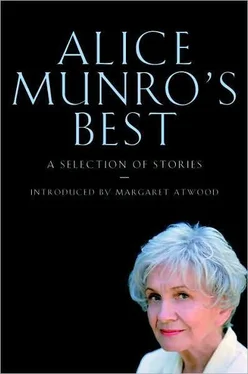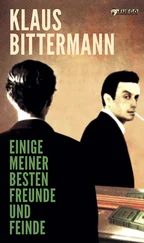“And the mosquitoes, you know they’re not as bad every year,” Eve said. “Usually they’re just bad in the early summer. June, before you’d even get here. In the spring there are all these boggy places full of water, and they breed there, and then the boggy places dry up, and they don’t breed again. But this year there was so much rain earlier, those places didn’t dry up, so the mosquitoes got a second chance, and there’s a whole new generation.”
She had found out how much he respected information and preferred it to her opinions and reminiscences.
Sophie was not keen on reminiscence either. Whenever the past that she and Eve had shared was mentioned — even those months after Philip’s birth that Eve thought of as some of the happiest, the hardest, the most purposeful and harmonious, in her life — Sophie’s face took on a look of gravity and concealment, of patiently withheld judgments. The earlier time, Sophie’s own childhood, was a positive minefield, as Eve discovered, when they were talking about Philip’s school. Sophie thought it a little too rigorous, and Ian thought it just fine.
“What a switch from Blackbird,” Eve said, and Sophie said at once, almost viciously, “Oh, Blackbird. What a farce. When I think that you paid for that. You paid .”
Blackbird was an ungraded alternative school that Sophie had gone to (the name came from “Morning Has Broken”). It had cost Eve more than she could afford, but she thought it was better for a child whose mother was an actress and whose father was not in evidence. When Sophie was nine or ten, it had broken up because of disagreements among the parents.
“I learned Greek myths and I didn’t know where Greece was,” said Sophie. “I didn’t know what it was. We had to spend art period making antinuke signs.”
Eve said, “Oh, no, surely.”
“We did. And they literally badgered us — they badgered us — to talk about sex. It was verbal molestation. You paid .”
“I didn’t know it was as bad as all that.”
“Oh well,” said Sophie. “I survived.”
“That’s the main thing,” Eve said shakily. “Survival.”
SOPHIE’S FATHER WAS from Kerala, in the southern part of India. Eve had met him, and spent her whole time with him, on a train going from Vancouver to Toronto. He was a young doctor studying in Canada on a fellowship. He had a wife already, and a baby daughter, at home in India.
The train trip took three days. There was a half-hour stop in Calgary. Eve and the doctor ran around looking for a drugstore where they could buy condoms. They didn’t find one. By the time they got to Winnipeg, where the train stopped for a full hour, it was too late. In fact — said Eve, when she told their story — by the time they got to the Calgary city limits, it was probably too late.
He was travelling in the day coach — the fellowship was not generous. But Eve had splurged and got herself a roomette. It was this extravagance — a last-minute decision — it was the convenience and privacy of the roomette that were responsible, Eve said, for the existence of Sophie and the greatest change in her, Eve’s, life. That, and the fact that you couldn’t get condoms anywhere around the Calgary station, not for love or money.
In Toronto she waved goodbye to her lover from Kerala, as you would wave to any train acquaintance, because she was met there by the man who was at that time the serious interest and main trouble in her life. The whole three days had been underscored by the swaying and rocking of the train — the lovers’ motions were never just what they contrived themselves, and perhaps for that reason seemed guiltless, irresistible. Their feelings and conversations must have been affected, too. Eve remembered these as sweet and generous, never solemn or desperate. It would have been hard to be solemn when you were dealing with the dimensions and the projections of the roomette.
She told Sophie his Christian name — Thomas, after the saint. Until she met him, Eve had never heard about the ancient Christians in southern India. For a while when she was in her teens Sophie had taken an interest in Kerala. She brought home books from the library and took to going to parties in a sari. She talked about looking her father up, when she got older. The fact that she knew his first name and his special study — diseases of the blood — seemed to her possibly enough. Eve stressed to her the size of the population of India and the chance that he had not even stayed there. What she could not bring herself to explain was how incidental, how nearly unimaginable, the existence of Sophie would be, necessarily, in her father’s life. Fortunately the idea faded, and Sophie gave up wearing the sari when all those dramatic, ethnic costumes became too commonplace. The only time she mentioned her father, later on, was when she was carrying Philip, and making jokes about keeping up the family tradition of flyby fathers.
NO JOKES LIKE that now. Sophie had grown stately, womanly, graceful, and reserved. There had been a moment — they were getting through the woods to the beach, and Sophie had bent to scoop up Daisy, so that they might move more quickly out of range of the mosquitoes — when Eve had been amazed at the new, late manifestation of her daughter’s beauty. A full-bodied, tranquil, classic beauty, achieved not by care and vanity but by self-forgetfulness and duty. She looked more Indian now, her creamed-coffee skin had darkened in the California sun, and she bore under her eyes the lilac crescents of a permanent mild fatigue.
But she was still a strong swimmer. Swimming was the only sport she had ever cared for, and she swam as well as ever, heading it seemed for the middle of the lake. The first day she had done it she said, “That was wonderful. I felt so free.” She didn’t say that it was because Eve was watching the children that she had felt that way, but Eve understood that it didn’t need to be said. “I’m glad,” she said — though in fact she had been frightened. Several times she had thought, Turn around now, and Sophie had swum right on, disregarding this urgent telepathic message. Her dark head became a spot, then a speck, then an illusion tossed among the steady waves. What Eve feared, and could not think about, was not a failure of strength but of the desire to return. As if this new Sophie, this grown woman so tethered to life, could be actually more indifferent to it than the girl Eve used to know, the young Sophie with her plentiful risks and loves and dramas.
“WE HAVE TO GET that movie back to the store,” Eve said to Philip.
“Maybe we should do it before we go to the beach.”
Philip said, “I’m sick of the beach.”
Eve didn’t feel like arguing. With Sophie gone, with all plans altered, so that they were leaving, all of them leaving later in the day, she was sick of the beach, too. And sick of the house — all she could see now was the way this room would look tomorrow. The crayons, the toy cars, the large pieces of Daisy’s simple jigsaw puzzle, all swept up and taken away. The storybooks gone that she knew by heart. No sheets drying outside the window. Eighteen more days to last, by herself, in this place.
“How about we go somewhere else today?” she said.
Philip said, “Where is there?”
“Let it be a surprise.”
EVE HAD COME home from the village the day before, laden with provisions. Fresh shrimp for Sophie — the village store was actually a classy supermarket these days, you could find almost anything — coffee, wine, rye bread without caraway seeds because Philip hated caraway, a ripe melon, the dark cherries they all loved, though Daisy had to be watched with the stones, a tub of mocha-fudge ice cream, and all the regular things to keep them going for another week.
Читать дальше












